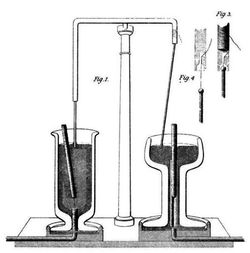
MICHAEL FARADAY
"Such peace is alone the gift of God, and as it is He who gives it, why should we be afraid? His unspeakable gift in His beloved Son is the ground of no doubtful hope, and there is the rest for those who (like you and me) are drawing near the latter end of our terms here below."
MICHAEL FARADAY
Michael Faraday is best known for his work in electricity and magnetism. He was the first to produce an electric current from a magnetic field, providing the foundation for electromagnetic field theory in physics. He also discovered the principle underlying the laws of electrolysis. Faraday’s inventions include the first electric motor and an early form of the Bunsen burner, currently used in science labs around the world as a source of heat for experiments.
Faraday’s discoveries transformed electricity into a powerful new technology. His research was used in developing machines that significantly affected engineering and industry in the nineteenth century. Also, a unit of measurement still used in physics (“farad”) is named after Faraday.
Faraday had only a basic formal education. At the age of 14, he began reading science books on his own and doing simple experiments with electricity. As a young adult, Faraday worked as a lab assistant to a leading scientist. He got the job because he was passionate about science and took detailed notes during the scientist’s lectures that Faraday attended. Soon Faraday began conducting original research and his own experiments, launching his career as a respected physicist and chemist.
Geniuses like Albert Einstein viewed Faraday as one of the most influential scientists in history. Einstein, who kept Faraday’s picture on his wall, said that Faraday “had made the greatest change in our conception of reality.”
CENTERED ON CHRIST
Faraday, a devout Christian, believed that God created the world and that nature proved his existence and power. His discoveries were inspired by his belief that God established laws of nature that could be discovered through scientific investigation.
In speaking about electricity, Faraday wrote in his lecture notes: “Electricity is often called wonderful, beautiful; but it is so only in common with the other forces of nature. The beauty of electricity or of any other force is not that the power is mysterious… but that it is under law, and that the taught intellect can even now govern it largely… for by enabling the mind to apply the natural power through law, it conveys the gifts of God to man.”
 Electromagnetic rotation experimentElectromagnetic rotation experiment of Faraday, 1821 |  Michael Faraday in his laboratoryMichael Faraday in his laboratory, 1850s |  Faraday disk generatorThe Faraday disk was the first electric generator, 1831 |
|---|---|---|
 Portrait of FaradayPortrait of Faraday in his late thirties, 1826 |  Michael FaradayMichael Faraday oil on canvas Artist: Thomas Phillips, 1842 |